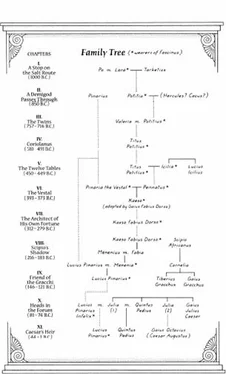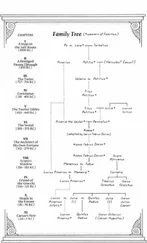Steven Saylor - Roma.The novel of ancient Rome
Здесь есть возможность читать онлайн «Steven Saylor - Roma.The novel of ancient Rome» весь текст электронной книги совершенно бесплатно (целиком полную версию без сокращений). В некоторых случаях можно слушать аудио, скачать через торрент в формате fb2 и присутствует краткое содержание. Жанр: Исторические приключения, на английском языке. Описание произведения, (предисловие) а так же отзывы посетителей доступны на портале библиотеки ЛибКат.
- Название:Roma.The novel of ancient Rome
- Автор:
- Жанр:
- Год:неизвестен
- ISBN:нет данных
- Рейтинг книги:5 / 5. Голосов: 1
-
Избранное:Добавить в избранное
- Отзывы:
-
Ваша оценка:
- 100
- 1
- 2
- 3
- 4
- 5
Roma.The novel of ancient Rome: краткое содержание, описание и аннотация
Предлагаем к чтению аннотацию, описание, краткое содержание или предисловие (зависит от того, что написал сам автор книги «Roma.The novel of ancient Rome»). Если вы не нашли необходимую информацию о книге — напишите в комментариях, мы постараемся отыскать её.
Roma.The novel of ancient Rome — читать онлайн бесплатно полную книгу (весь текст) целиком
Ниже представлен текст книги, разбитый по страницам. Система сохранения места последней прочитанной страницы, позволяет с удобством читать онлайн бесплатно книгу «Roma.The novel of ancient Rome», без необходимости каждый раз заново искать на чём Вы остановились. Поставьте закладку, и сможете в любой момент перейти на страницу, на которой закончили чтение.
Интервал:
Закладка:
He left the house and wandered aimlessly for a while, watching the city awaken. At the great houses on the Palatine, slaves opened front doors to air the vestibules, extinguished the lamps that had burned all night, and swept the thresholds. Between two houses, Lucius caught a distant view of the Forum Boarium and the Tiber waterfront. Down in the marketplace, merchants were setting up shop. Many had special displays of baskets stuffed with food. Customers were already lining up to buy the baskets. Lucius had forgotten that this was the feast day of Anna Perenna, a holiday celebrated only by the plebeians.
Anna Perenna was the crone goddess, always portrayed with gray hair, a wrinkled face, and a stooped back; she wore a traveling cloak and carried baskets stuffed with food. Her legend dated to the early days of the Republic, when the plebeians staged their first so-called secession, withdrawing en masse from the city to protest the special privileges of the patricians and to demand tribunes for their protection. When the plebeians ran low on provisions, an old woman calling herself Anna Perenna appeared among them with baskets of food. No matter how much food people took from the baskets, the baskets remained miraculously full, and so the plebs never went hungry.
After the secession, Anna Perenna vanished, never to be seen again. On the day sacred to her, the Ides of Martius, plebeian families left the city to picnic on the banks of the Tiber. They gathered their own baskets of food, or bought ready-made baskets at the market. They pitched small tents and laid out blankets. Children played games with balls and sticks in the grass. Young couples courted in leafy bowers. Everyone ate and drank their fill, then dozed on the banks of the river. At sundown, the plebeian families would stream back into the city in an informal procession, singing songs of praise to Anna Perenna.
The holiday meant little to Lucius. Being a patrician, he had never taken part. Still, strolling across the Forum, passing families on their way to the river carrying food baskets, blankets, and toys, he found their festive mood infectious. It further amused him to think that among all these carefree revelers, he alone knew what a momentous and memorable day this would turn out to be, thanks to the special requests that Caesar would put before the Senate.
Thinking of Caesar, Lucius walked to the area directly north of the ancient Forum, where a large tract of land had in recent years been cleared and rebuilt by his great-uncle and named after him. The Julian Forum was surrounded by a vast rectangular portico of gleaming marble columns. At one end stood the new temple dedicated to Venus, constructed of solid marble, the fulfillment of a vow Caesar had made to the goddess before his victory at Pharsalus. In front of the temple was a fountain adorned with nymphs. Dominating the open square was a magnificent statue of Caesar armored for battle and sitting atop a white charger.
Work on the forum was not finished. When it was done, the portico would open onto courtrooms and legal offices. The comings and goings of scribes, secretaries, judges, and advocates would make the Julian Forum one of the busiest spots in Roma. As it was, on this morning, Lucius was the only person present. He walked under the statue of Caesar, amused to see the very grave look on his great-uncle’s face, then past the fountain, which was full of water but not splashing. Its still face reflected the perfect proportions and dazzling marble facade of the Temple of Venus.
Lucius mounted the steps. A temple slave dozing beside the doorway stirred at his approach. Recognizing Lucius-the dictator’s kinsmen were frequent visitors to the temple of their ancestress-the slave hastily opened the doors for him.
In Lucius’s opinion, the inside of the temple was the most beautiful interior space in all of Roma, perhaps in all the world. The floors, walls, ceiling, and columns were made of solid marble in a staggering array of colors, and newly finished, so that every surface gleamed with a mirror-like polish. The facing walls of the short vestibule were decorated by two of the most famous paintings in the world, the Ajax and the Medea by the renowned artist Timomachus. Within the sanctuary, displayed in six cabinets, were the extraordinary collections of jewels and gemstones which Caesar had acquired in his travels. To Lucius, the most fascinating item was a savage-looking breastplate strung with tiny pearls from the island of Britannia.
At the far end of the chamber, magnificent upon her pedestal, stood Venus herself, as captured in marble by Arcesilaus, the most highly paid sculptor in the world. The goddess stood with one arm bent back to touch her shoulder and her other arm slightly extended; one of her breasts was bare. The molding of her serene features and the folds of her thin gown were extraordinarily delicate.
Next to Venus stood an equally impressive statue of Cleopatra, executed in bronze and covered with gold. The queen was portrayed not in the outlandish garb of the Pharaohs, which the Ptolemies had appropriated when they assumed the rule of Egypt, but in elegant Greek dress, more chastely covered than Venus and wearing a simple diadem on her brow. To Lucius’s eye, Cleopatra was not a particularly beautiful woman-certainly not as beautiful as the idealized image of Venus beside her-but the sculptor had nonetheless managed to capture that indefinable quality that had so captivated a man like Caesar. Caesar’s decision to place her statue in the new Temple of Venus had sparked intense speculation about his intentions. If the purpose of the temple was to honor his ancestress, what place did the queen of Egypt have there, unless Caesar intended to make her the mother of his own descendents?
Lucius had met the queen only once, when she first arrived in Roma for her state visit. During the feasting and entertainments, Lucius had been briefly introduced to her as one of Caesar’s young relatives. The queen had been gracious but aloof; Lucius had been completely tongue-tied. Since then, Caesar had installed Cleopatra at a sumptuous garden estate on the farther bank of the Tiber, where the queen had hosted a number of lavish dinners to introduce herself to the city’s elite.
Staring up at her statue, Lucius felt a sudden impulse to pay her a visit. Why not? Caesar’s overtures to him the previous night emboldened him. Lucius was not just one of the great man’s heirs; he was Caesar’s confidante. He had as much right to pay a social call on the queen of Egypt as any other Roman. To be sure, he was not formally outfitted in his toga, but he was wearing his best tunic. He turned about, left the temple, and headed for the bridge across the Tiber.
Passing through the marketplace in the Forum Boarium, he was surrounded by plebeians on their way to celebrate the Feast of Anna Perenna. There were so many of them heading out of the city that there was a queue to cross the bridge. On the other side, the picnickers drifted toward the public grounds along the riverbank, but Lucius pressed further on, toward the grand private estates that fronted the most desirable stretch of the Tiber. Here the wealthy of Roma had their second homes outside the city, where they could relax in their gardens, pursue the fashionable hobby of beekeeping, and go boating and swimming in the river.
At one of the grandest of these houses, owned by Caesar, Cleopatra had taken up residence. When Lucius knocked at the gate, an Egyptian slave, his eyes outlined with kohl, peered at him through the peephole. Lucius announced himself-“Lucius Pinarius, great-nephew of Gaius Julius Caesar”-and a few moments later the slave opened the gate.
The big man peered beyond him. “Only you?” he said in Greek.
Lucius laughed. “I suppose the queen has very few visitors who arrive without an entourage, and on foot. But yes, it’s only me. My uncle is otherwise engaged today, as the queen probably knows.”
Читать дальшеИнтервал:
Закладка:
Похожие книги на «Roma.The novel of ancient Rome»
Представляем Вашему вниманию похожие книги на «Roma.The novel of ancient Rome» списком для выбора. Мы отобрали схожую по названию и смыслу литературу в надежде предоставить читателям больше вариантов отыскать новые, интересные, ещё непрочитанные произведения.
Обсуждение, отзывы о книге «Roma.The novel of ancient Rome» и просто собственные мнения читателей. Оставьте ваши комментарии, напишите, что Вы думаете о произведении, его смысле или главных героях. Укажите что конкретно понравилось, а что нет, и почему Вы так считаете.











